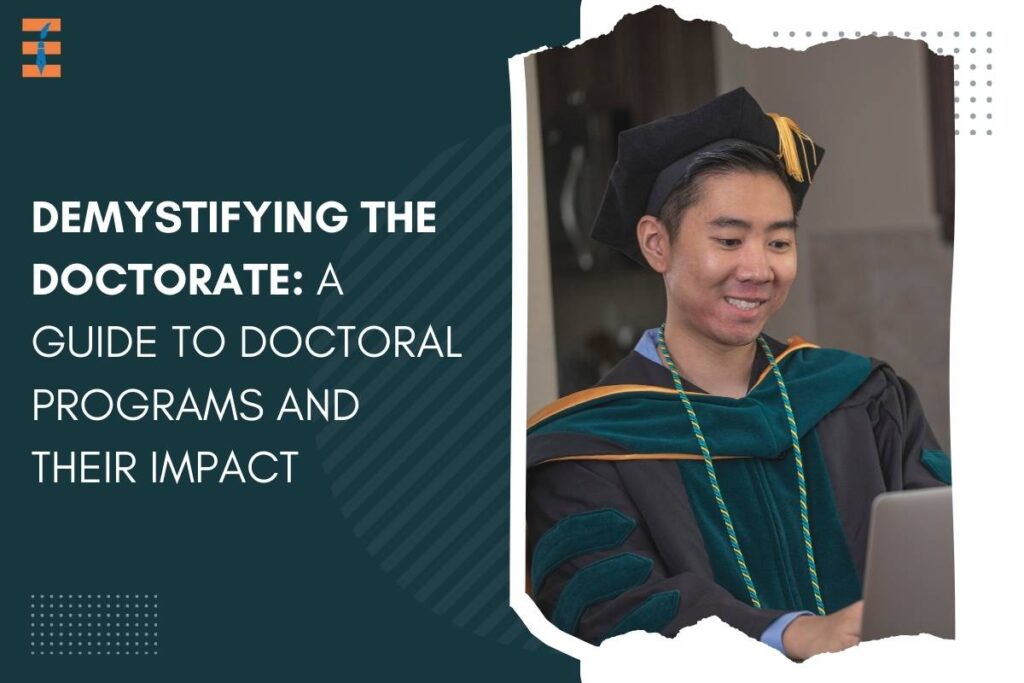Have you ever felt a burning desire to truly understand a subject, to push the boundaries of knowledge in a field you love? Perhaps a doctoral program could be your launchpad. These prestigious programs offer ambitious individuals a chance to dive deep, explore their intellectual curiosity, and propel themselves toward exciting career opportunities.
However, the world of doctoral degrees can feel like a maze, especially if you’re unfamiliar with its twists and turns. This guide aims to be your compass, helping you navigate the different types of doctoral programs, the requirements to get started, and the potential rewards that await you on this academic journey.
Unveiling the Landscape of Doctoral Degrees
Understanding the different types of doctoral degrees is crucial when embarking on this academic journey. Here’s a breakdown of the most common ones:
1. Doctor of Philosophy (Ph.D.)

This is the most well-known doctoral degree, emphasizing original research and culminating in a dissertation that contributes new knowledge to a specific field. It typically requires coursework, comprehensive exams, and a lengthy research project. Ph.D. programs are offered in a wide range of disciplines, including the humanities, social sciences, natural sciences, and engineering.
2. Professional Doctorates
These programs focus on applied knowledge and professional practice. Examples include the Doctor of Business Administration (DBA), Doctor of Education (Ed.D.), and Doctor of Nursing Practice (DNP). Professional doctorates often require coursework, a residency or practicum, and a capstone project demonstrating expertise in the chosen field.
3. Other Doctoral Degrees
Less common options include a Doctor of Juridical Science (J.D.) for law, a Doctor of Musical Arts (D.M.A.) for music performance, and a Doctor of Fine Arts (M.F.A.) for creative fields like visual arts or writing. These programs typically have specific admission requirements and program structures.
Requirements and Eligibility: What Does it Take to Enter a Doctoral Program?
Admission to a doctoral program is highly competitive. Here’s an overview of the typical requirements:
1. Master’s Degree
Most doctoral programs require a Master’s degree in a relevant field from an accredited institution.
2. Strong Academic Record
Applicants need to demonstrate academic excellence through a strong GPA (Grade Point Average) in their previous degrees.
3. Standardized Tests
Many programs require standardized tests like the GRE (Graduate Record Examination) or GMAT (Graduate Management Admission Test), depending on the field.
4. Letters of Recommendation
Strong letters of recommendation from professors familiar with the applicant’s academic abilities and research potential are usually required.
5. Research Statement/Proposal
Some programs require a research statement or proposal outlining the applicant’s area of interest and potential dissertation topic.
6. Work Experience (for professional doctorates)
Professional doctoral programs may require relevant work experience in the field.
The Investment: Time, Costs, and Funding Opportunities
Doctoral programs are an investment in both time and money. Ph.D. programs can take anywhere from four to eight years to complete, while professional doctorates might be shorter, typically ranging from two to four years.
The program costs vary considerably depending on the institution, program type, and location. Public universities tend to be more affordable than private institutions. Financial aid options are available for doctoral students, including scholarships, fellowships, research assistantships, and teaching assistantships.
The Road Ahead: What to Expect During a Doctoral Program
Doctoral programs are an intellectually rigorous journey. Students can expect:
1. Advanced Coursework
Students will delve deeply into a specific subject area, taking advanced courses from leading scholars in the field.
2. Research Emphasis
Ph.D. programs heavily emphasize research skills. Students will receive training in research methodology, data analysis, and critical thinking.
3. Dissertation
The dissertation is the culmination of doctoral research, requiring independent research, data collection, and analysis on a specific topic.
4. Comprehensive Exams
Students might need to pass comprehensive exams to demonstrate mastery of their chosen field before proceeding with the dissertation.
5. Teaching Opportunities

Some programs offer teaching assistantships, providing valuable experience in classroom instruction and communication skills.
Beyond the Degree: The Rewards of a Doctorate
A doctoral degree unlocks a world of professional possibilities. Here are some of the potential benefits:
1. Advanced Career Opportunities
A doctorate qualifies an individual for higher-level positions in academia, research institutions, government agencies, and private companies.
2. Increased Earning Potential
Doctoral graduates typically command higher salaries compared to those with lower degrees.
3. Expert Status
A doctorate establishes you as an expert in your field, fostering respect and credibility among peers and colleagues.
4. Research and Teaching Skills
Doctoral programs equip graduates with valuable research and teaching skills, applicable in diverse professional settings.
5. Intellectual Growth and Personal Satisfaction
Doctoral programs provide an unparalleled opportunity for intellectual exploration and contribute to the advancement of knowledge in your chosen field.
Making the Decision: Is a Doctorate Right for You?
Before embarking on the demanding yet rewarding journey of a doctoral program, it’s crucial to assess whether it aligns with your personal and professional goals. Here are some key questions to consider:
1. Passion for the Field
Do you have a genuine and deep-seated passion for the subject matter you wish to pursue? Doctoral programs require sustained dedication and perseverance, and intellectual curiosity is a vital fuel for success.
2. Research Interest
Are you drawn to independent research and critical thinking? Do you enjoy delving into complex problems and contributing new knowledge? A doctoral program is heavily focused on research, and a strong aptitude for it is essential.
3. Time Commitment
Doctoral programs require a significant investment of time and energy. Are you prepared to dedicate several years to intensive coursework, research, and dissertation writing? Evaluate your current life situation and consider how a doctoral program would impact your personal and professional commitments.
4. Financial Considerations
The cost of a doctoral program can be substantial. Research funding opportunities and financial aid options available. Be realistic about the financial commitment required and explore ways to manage it effectively.
5. Career Aspirations
How will a doctoral degree contribute to your long-term career goals? Research potential job opportunities requiring a doctorate in your field and assess the salary range compared to your current or desired career path.
6. Alternative Routes
Explore other educational or professional development avenues that might achieve your career goals if a doctoral program seems overwhelming. Consider Master’s degrees, professional certifications, or on-the-job training programs depending on your field.
Beyond the Ivory Tower: Exploring Alternative Paths
The pursuit of knowledge doesn’t have to be confined to traditional doctoral programs. Here are some alternative paths for individuals seeking intellectual growth and professional development:
1. Professional Certifications

Many professions offer industry-recognized certifications that enhance skills and marketability without the time commitment of a doctoral program.
2. Online Courses and Learning Platforms
Online courses and platforms are abundant offering in-depth learning opportunities on diverse topics from leading universities and institutions.
3. Mentorship and Independent Learning
Seeking mentorship from established professionals in your field and engaging in independent research projects can be a valuable way to deepen your knowledge and expertise.
Conclusion:
Doctoral programs can be a launchpad for those passionate about a field, eager to push knowledge forward, and seeking career advancement. This guide equips you with the essentials: different degrees, admission hurdles, program structure, and potential rewards.
The decision is substantial. Reflect on your passion for research and the time commitment required. Consider financial resources and available support.
The path you choose is yours. Doctoral programs offer a fulfilling journey, but there are enriching alternatives like certifications and online courses. Regardless of the path, embrace lifelong learning and excellence in your field. Dedication and passion will pave the way for professional success and intellectual fulfillment. Remember, the pursuit of knowledge is a rewarding adventure.
Also Read: Top 10 Universities in the US










